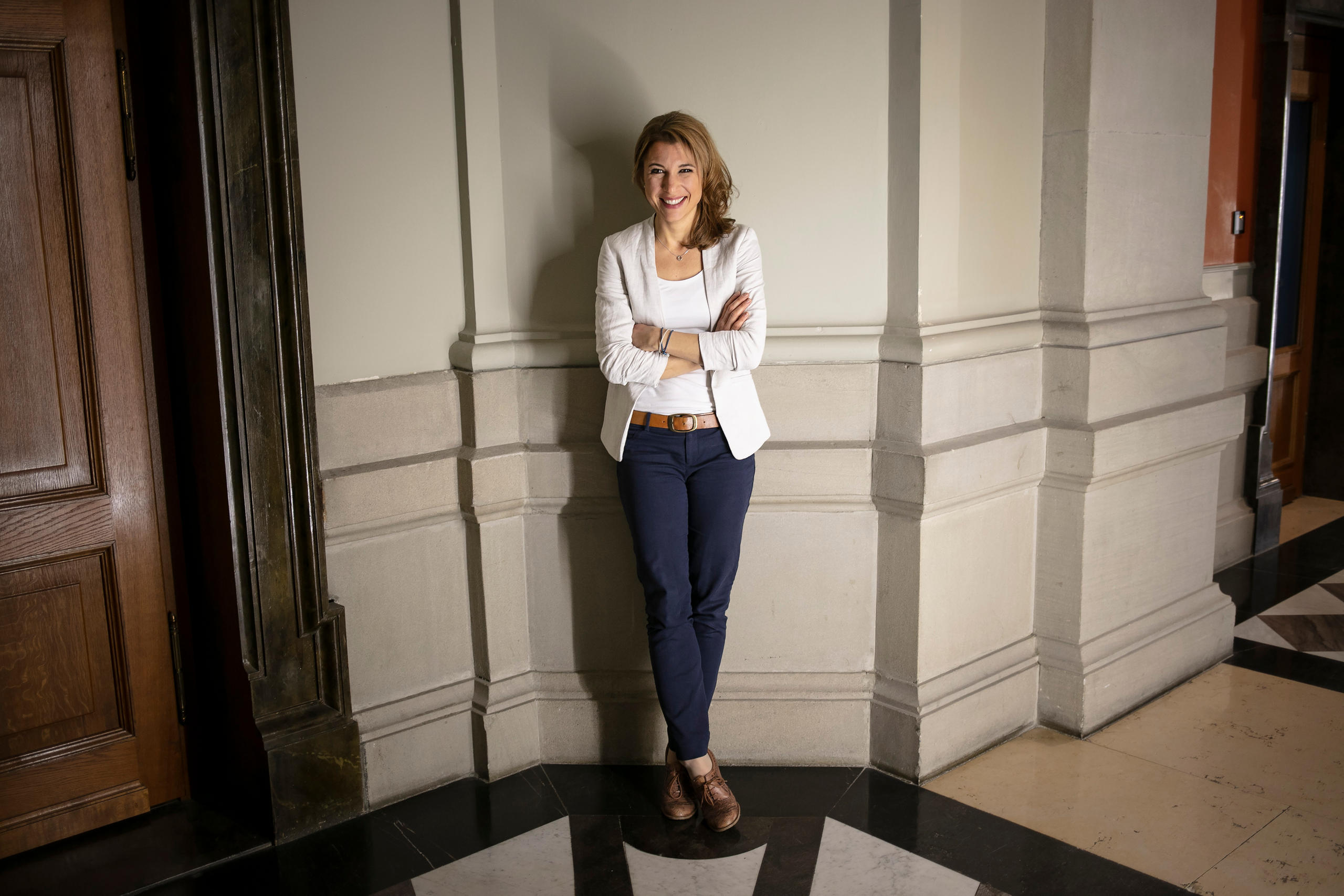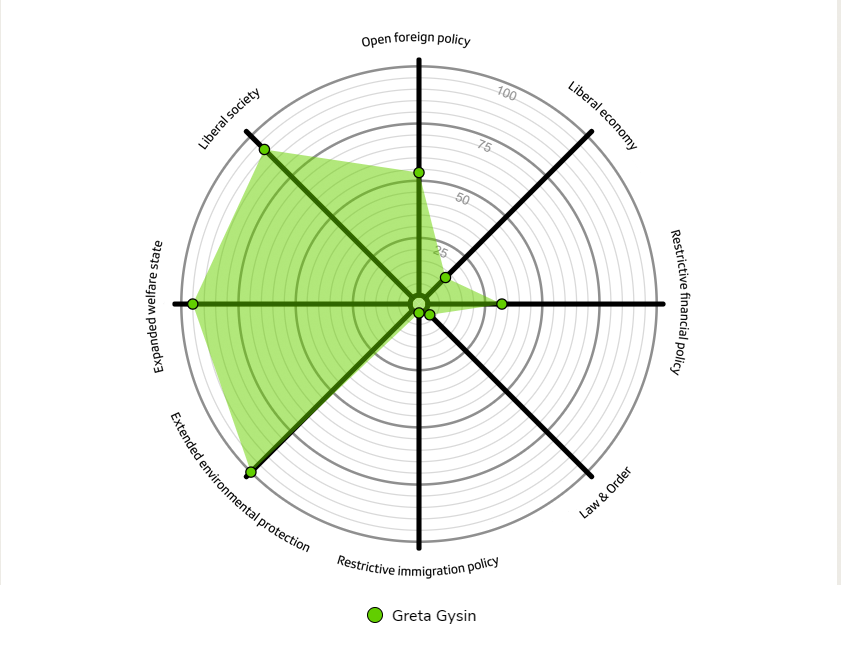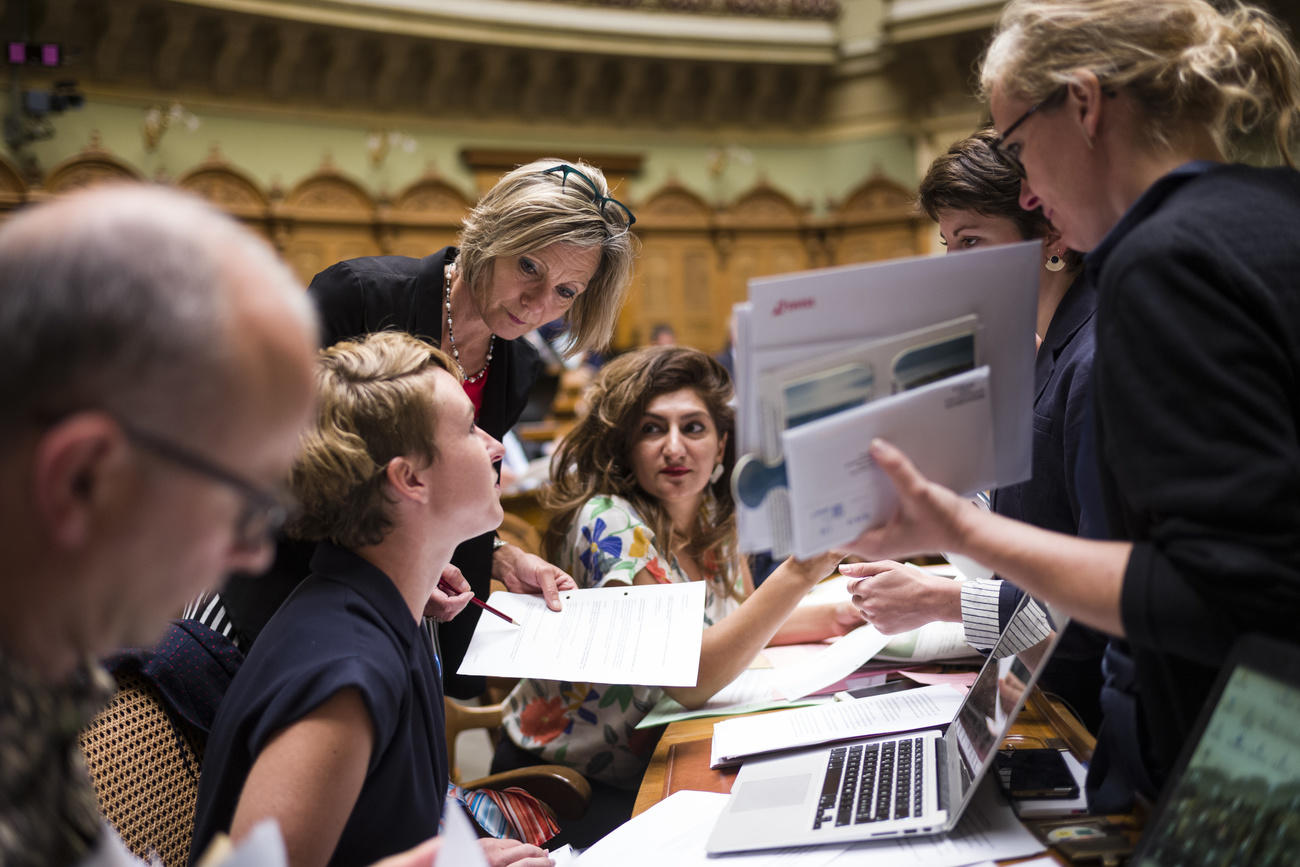The environment is her priority, social issues too

She is the first Green parliamentarian from Ticino to be elected to the House of Representatives. At 36, Greta Gysin has served at all three levels of the Swiss federal system. Her top priority is the environment, followed a close second by workers’ rights.
Sincerity and politics are what Gysin is all about. “Since I was a child, I have felt a great need to state my opinion clearly. Yet always with an attitude of respect,” says the new member of parliament, as she sips a cappuccino in a café in Zurich’s main railway station.
Respect for others was a basic value her parents taught her, and she has made it her guiding principle.
When she was a teenager in secondary school, “my need to say my piece took on more and more of a political flavour”, she recalls. Around this time, her involvement in politics went a step further than talking to school friends. Gysin was a member of the Youth ParliamentExternal link in her canton.
Last October, Swiss citizens elected the most female parliament in the country’s history. Although parity has not yet been achieved, women now account for 42% of members of the House of Representatives. To mark the occasion, swissinfo.ch is presenting the profiles of up to eight newly-elected parliamentarians from different parties.
When she went on to university, she found she needed to study what was in her DNA: political science, and then sociology and history, at the University of Zurich.
Now in parliament in Bern, she can draw on 11 years of parliamentary experience at two other levels – municipal and cantonal. But the new member of parliament, who talked to swissinfo.ch during the winter session of parliament, does not put too much emphasis on this.
“Going through different levels of the political institutions is certainly useful,” she says. “But it is not indispensable, because all these settings are in fact different. “The Swiss parliament, she finds, has about it a “great professionalism – there really is quite a difference between this and a cantonal parliament.”
Mercurial career
Although she has politics in her blood, Gysin’s start in the political system at the age of 21 happened “more or less by chance” Asked by a neighbour, she agreed to stand for election to the municipal council in RovioExternal link, a village near the Italian border, where she grew up, “just to put my name down”. She was surprised to find herself elected.
She was fascinated by being a political representative, and she enjoyed a rapid ascent. Three years later, Gysin was elected to Ticino’s cantonal parliament.

Determined but unfailingly courteous, Gysin distinguished herself in Ticino politics by the quantity and the quality of her work, and she earned the esteem of many outside her party ranks.
“Beyond the fairly strong differences in ideological vision,” says Christian Democratic Party member of parliament Fabio Regazzi, who was also a cantonal representative at the time. “I have always appreciated her as an intelligent, competent, well-prepared and determined politician.
Former Radial-Liberal representative Edo Bobbià adds: “In spite of our diverging views, I remember her as a capable and decisive colleague in the cantonal parliament, but also one with understanding for the positions of others.”
With studies, politics and working at a living between the Italian-language Ticino region, Zurich and Bern, the young Green politician’s commitments were wide-ranging and her energy seemed limitless. “It is also largely a matter of organisation – and I am well-organised,” she explains with a smile.
In 2014, she had her first child, Enea. The next year, she did not stand for the cantonal elections. In 2017 she had twins, Ada and Lelia. The focus of work and family life for her is now Zurich, but her connections with Ticino remain close, and her interest in politics is more lively than ever.
Triumphant return
When she was asked to stand for the Swiss elections in 2019, Gysin, after careful reflection, decided to take on the challenge. But it was no longer “just to put her name down”. This time she played to win.
It turned out to be a historic triumph for her, along with colleague Marina Carobbio Guscetti. Gysin became the first Ticino Green elected to the House of Representatives, and Carobbio was the first woman and first Social Democrat from Ticino elected to the Senate. The two newcomers took the seats of two high-profile outgoing politicians.

In Ticino, given her notoriety well before Greta Thunberg, Gysin would not need to have the same first name as the number-one climate activist to attract attention.
But a Green called Greta running for parliament and then elected in the same year that a global movement on climate change was started by the Swedish schoolgirl who is now a household name, was too good for the media to resist: they quickly turned their attention to her, calling her ‘Switzerland’s Greta’ or ‘Ticino’s Greta’.
Her response was an ironic one – she adopted the slogan ’Greta? Gysin!’External link
Environment and social issues
Whether as a cantonal parliamentarian or a trade unionist, she has always concerned herself with problems around pay and working conditions. This would of course be a typical focus for a Social Democrat. So why does Gysin belong to the Greens and not the Social Democratic Party?
“Because the Green’s number one priority is the environment, with social issues in second place, whereas with the Social Democratic Party it’s the other way around,” she responds without hesitation.
“But it is clear that these two issues are closely related,” she adds.
Gysin has operated in both fields in her work career. «My first job was in the area of renewable energies, as a project leader. Then, four years ago, I moved to the public service union, Transfair.” She decided to give up this job located in Zurich at the end of 2019, so she could concentrate on her work in the House of Representatives, and also so she could go back and live in Ticino.

Climate, EU relations
Looking at the current legislative session, she regards the CO2 legislation as “absolute priority” of the Swiss parliament, “because the climate issue is the most urgent one we need to tackle”.
In her view, there should be an immediate ban on installation of oil heating systems. Then the need is to “work more seriously on mobility, improving public transport, especially in the outlying regions”.
After having put together a valid “alternative offer, we will have to take away the incentive for petrol-fuelled private motoring. We will probably have to do this by putting up the price of petrol.”
Another dossier she is concerned about is the framework agreement between Switzerland and the European Union. “It should be renegotiated,” she says.
“Now of course, in negotiation you can’t just take, you also have to give. But we need a fair balance, and not to water down the accompanying measures.
These latter “are vital for the labour market in Switzerland, but also for the bilateral approach. Because if they are dropped, the Swiss people will find it hard to keep supporting this approach, which was accepted because of them.”
e-voting pioneer in Ticino
With Gysin, the expatriate Swiss community has a new ally in parliament to support the cause of online voting.
She was the first in the Ticino cantonal assembly to call for its introduction, presenting a motion in its favour as early as 2009. Today, bucking the trend in her own party, she believes more than ever that “putting a secure electronic voting system in place is something we owe to the Swiss Abroad.
As a second step, such a system could be extended to the whole of Switzerland. It would benefit everyone.”
Gysin believes that the Swiss government should “provide the necessary means to let us develop a secure solution.”
Adpated from Italian by Terence MacNamee/urs

In compliance with the JTI standards
More: SWI swissinfo.ch certified by the Journalism Trust Initiative














You can find an overview of ongoing debates with our journalists here . Please join us!
If you want to start a conversation about a topic raised in this article or want to report factual errors, email us at english@swissinfo.ch.